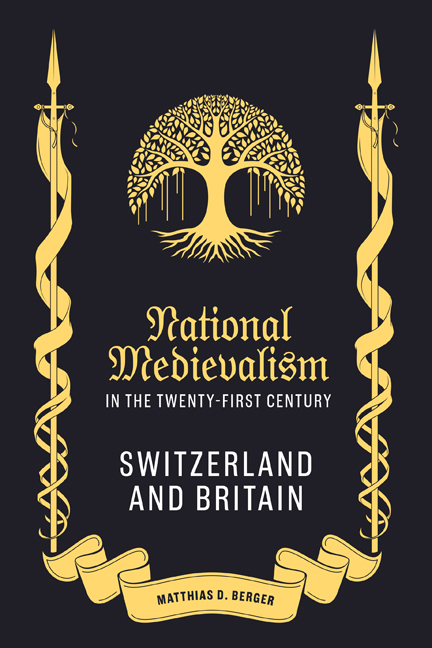Book contents
- Frontmatter
- Dedication
- Contents
- List of Illustrations
- Acknowledgements
- Author’s Note
- List of Abbreviations
- Introduction
- 1 Constructing Continuity: Four Nations Imagine Their Beginnings
- Part I The Politics of Autochthony
- 2 For Freedom Alone: The Scottish Independence Referendum
- 3 2016 and All That: Brexit
- 4 Freiheit statt Vögte: The Swiss National-Conservatives
- Part II The Others of National Medievalism
- 5 Masculine Middle Ages: Gender
- 6 In Strange Lands: Race, Ethnicity, Immigration
- Conclusion: The Demands of the Past
- Afterword: National Medievalism in the Age of COVID-19
- Bibliography
- Index
- Medievalism
6 - In Strange Lands: Race, Ethnicity, Immigration
Published online by Cambridge University Press: 17 December 2023
- Frontmatter
- Dedication
- Contents
- List of Illustrations
- Acknowledgements
- Author’s Note
- List of Abbreviations
- Introduction
- 1 Constructing Continuity: Four Nations Imagine Their Beginnings
- Part I The Politics of Autochthony
- 2 For Freedom Alone: The Scottish Independence Referendum
- 3 2016 and All That: Brexit
- 4 Freiheit statt Vögte: The Swiss National-Conservatives
- Part II The Others of National Medievalism
- 5 Masculine Middle Ages: Gender
- 6 In Strange Lands: Race, Ethnicity, Immigration
- Conclusion: The Demands of the Past
- Afterword: National Medievalism in the Age of COVID-19
- Bibliography
- Index
- Medievalism
Summary
What happens when you leave a country, when you arrive elsewhere? Do you take your own story with you? Or are you like a new character entering an old story?
THE CODES OF difference of race and ethnicity have historically produced even more insistent othering in the national context than gender has. In post-war British and Swiss history, this has occurred especially in the discursive orbit of immigration. Not only are the stories of immigrants and racial and ethnic minority groups hardly ever deemed integral to national identity. The conceptual overlaps of nation, race and ethnicity mean that racial and ethnic others and immigrants will often be the very thing against which national identity constitutes itself. Such othering is particularly tangible in national self-conceptions that rely on the deep past. As I have suggested previously, notions of a cultural homogeneity pervade national medievalism to this day. Arguably, so do notions of ethnic and racial purity.
My main focus in this chapter is the making of racial and ethnic difference as it interacts with the national Middle Ages. However, rather than focusing on medievalisms that uncritically replicate or actively weaponise the othering of racial or ethnic minorities and immigrants in national origin stories (low-hanging if sadly plentiful fruit), I will mainly show how the intersectional cluster of race, ethnicity and immigration has lately been reinterpreted and critiqued in contemporary national medievalisms. Racial and ethnic othering may be starker than othering along gender lines, but contemporary responses to it have also been more incisive. I will begin by establishing some context and making terminological distinctions.
Mainstream accounts of the history of ‘race’ focus on the emergence of the ‘science’ of race, and hence scientific racism, during the Enlightenment, with race becoming a ‘category explaining all historical phenomena’ in the late nineteenth century. Over the last two decades, however, premodernists and critical race theorists such as Geraldine Heng have argued that post-Enlightenment scientific racism has blocked critics’ view of other, in some cases far earlier, forms of racial logic. According to Heng, this has led to premodernity being under-recognised as ‘racial time’.
- Type
- Chapter
- Information
- National Medievalism in the Twenty-First CenturySwitzerland and Britain, pp. 172 - 207Publisher: Boydell & BrewerPrint publication year: 2023

